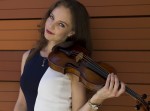The UCLA Camarades will embrace Slavic culture through music and poetry in their upcoming concert “Hope Against Hope.”
The string chamber music ensemble will perform at the concert alongside literary presentations by the UCLA Department of Slavic, East European and Eurasian Languages and Cultures on Tuesday. Myroslava Khomik, a violinist in the string ensemble, said the concert represents the continuation of musical collaboration among her and other UCLA alumni who have now moved on to work in the professional world, while also shedding more light on the Slavic culture.
“As an artist, I try to express and promote my background as much as I can through music,” Khomik said.
Khomik, one of the organizers of the concert, conceptualized the event while studying for her doctorate at UCLA. She wanted to continue collaborating with her fellow alumni following graduation to keep the connection that they shared while attending UCLA together. She began working with alumnus and composer Joshua Rodriguez while they were in UCLA’s doctorate program on a piece titled “Contra Spem Spero,” which he composed and paired with other chamber pieces.
The main concerto of the event takes inspiration from a poem of the same name, which translates to “I hope against hope.” The poem – an homage to Khomik’s Ukrainian roots – was written by the Ukrainian poet Lesya Ukrainka, which Rodriguez decided to highlight in the composition of the piece.
The poem focuses on the coming of the spring season under a lens of grief, featuring lines like, “For now springtime comes, agleam with gold!/ Shall thus in grief and wailing for ill-fortune/ All the tale of my young years be told?”
Rodriguez said the poem initially stood out to him because of its brazenly defiant tone, which is offset by hopeful undertones: The ideas of spring and new life emerging from the cold of winter were particularly moving as he wrote the composition. The poem does not represent spring in the traditional cheery way, but rather through a more solemn lens by focusing on rebirth while struggling against the elements – a parallel to the turbulent scenes taking place in Ukraine, he said.
“Knowing (Khomik) was from Ukraine, and that the country had gone through a terribly dark time, with police brutality against its own people in 2014, I decided to draw inspiration from that for the concerto,” Rodriguez said.
When writing the piece, Rodriguez said he drew inspiration from the turmoil taking place in Ukraine because of his friendship with Khomik. He spent hours sifting through Netflix documentaries about Ukraine as well as news stories for dramatic inspiration.
Rodriguez’s composition is divided into three movements. The first movement has an aggressive tone, undercut by several dance-like moments followed by a second movement, which employs a lamenting traditional Ukrainian folk tune roughly translated as “fog ravine, fog valley.” The third and last movement has the music of the first played backward, to represent the cycle of violence perpetuated in Ukraine.
Charlie Tyler, a cellist and a featured player in the concert, said the piece has many textures, thanks to the way the different instruments are layered together. He said the string part is particularly intricate, and each player has their own part, with Khomik having the featured solo.
“There’s a lot of interesting phasing between the parts and different ideas that get spread around the group, and every player has their own part even though there are nine or 10 people playing,” Tyler said.
In addition to the concerto, Khomik said the collaboration with the literary department came in part because of the poem that inspired the concert’s theme. She wants to give more representation to the literature of that culture.
“It is a very timely topic because we are in a time where we are all striving for a better world,” Khomik said. “We are trying to find ways to accept and to integrate other cultures in our society.”
